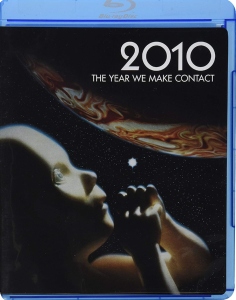With 2010 winding down, I decided to take a look back at “2010,” the 1984 movie, to see how prescient Peter Hyams (the film’s director) and Arthur C. Clarke (the book‘s author) were in predicting the future.
“2010” gets a lot of things wrong. I’m not intending to take Hyams and the late, great Clarke to task for making inaccurate predictions; even when sci-fi gets stuff wrong, it can still be fascinating and instructive.
But it is interesting that “2010” was off the mark at both extremes — landmark achievements at one end and day-to-day technology at the other: It overestimated our space travel ability yet underestimated the evolution of gadgetry.
In the movie, a joint Russian-American crew travels to Jupiter to investigate the abandoned Discovery from “2001: A Space Odyssey” as well as the Monolith, the giant black slab floating above the planet. In reality, neither country could go to the moon today, let alone Mars, let alone beyond Mars. Also, we still haven’t met an extraterrestrial race, but to be fair, that’s a case where science isn’t a lot of help in predicting a date.
In “2010,” one character mentions to another that the information he needs is on a “cassette.” That reminds me of novelist Philip K. Dick’s futures, where space travelers listen to music and store information on reel-to-reel tapes. So many sci-fi authors completely whiffed on CDs, iPods, cell phones, flat-screen TVs and the Internet. In their defense, though, I think it’s utterly bizarre that it’s almost 2011 and we still don’t have flying cars.
To “2010’s” credit, Roy Scheider’s character uses a laptop on a beach, and it looks sort of like a 2010 laptop (it’s slightly bulkier and the screen is a bit small). And just because “2010” doesn’t bluntly show the Internet or cell phones or other 2010 staples doesn’t necessarily mean it made a wrong prediction.
In terms of predicting computer power, “2010” delivers mixed results. Bob Balaban’s character talks with HAL conversationally, something we can’t quite do today, but it seems we are closer to that than we are to traveling to Jupiter. On the other hand, Balaban also crawls inside the computer to fix it; this is another example of a sci-fi author not anticipating the miniaturization of components. In dreaming big, Clarke should’ve dreamed small.
“2010” reminded me more of 1984 than 2010 with the multi-colored control panels in the spacecraft, the dark synthesizer music reminiscent of “The Terminator,” the Cold War plot and Scheider’s short shorts.
Arguably, though, it’s not all that important to get the future exactly right. In choosing a future setting for “1984,” George Orwell simply flipped the numbers of the year he wrote it, 1948. And I suspect that in 1967 Clarke chose 2001 as the year to start his “Space Odyssey” franchise because he and many of his readers would live to see the actual year.
On the other hand, he abandoned that notion for the fourth book, “3001: The Final Odyssey” (1997), but it was still a best-seller, which just goes to show that the story should be the king when it comes to choosing a date to set your story in. The TV series “Firefly” (2002) takes place in 2517 and “Futurama” (1999-present) takes place exactly 1,000 years in the future; the fact that we won’t be around then doesn’t diminish our enjoyment.

But there’s something to be said about a near-future date and how it gives viewers another element to chew over. Will we have genetically engineered soldiers by 2019 (“Dark Angel”)? Will we be able to travel to Mars by 2020 (“Mission to Mars”)? Will a machine allow us to travel backwards through time in 2029 (“The Terminator”)? Will we be able to travel to Neptune by 2047 (“Event Horizon”)? The answers are all “no,” most likely, but that doesn’t diminish the story’s quality.
And in post-apocalyptic tales, the fast-approaching date adds to the viewers’ apprehension. However, when the date arrives and the apocalypse doesn’t, it can be kind of funny, especially when the franchise is still going when the actual date arrives.
“The Terminator” (1984) predicted the apocalypse, driven by sentient computers, would come in 1997. It didn’t, and the franchise was still around with “Terminator 3: Rise of the Machines” in 2003, so it had to rewrite history (which was perfectly acceptable since the movie was themed around “possible futures”).
Many storytellers were pessimistic about the late-20th and early 21st century, and they weren’t necessarily off base (see wars on terror, the economy, reality TV, etc.), but they were a bit extreme in their predictions. The “Escape from New York” (1981) apocalypse was supposed to relegate criminals to an ungoverned island in 1997 and the electromagnetic pulse on TV’s “Dark Angel” (2000-02) wiped out all electronics in 2009. Granted, the real 2009 was a bad year, but at least our computers worked and we had cars.
And as for 2010, well, we didn’t journey to Jupiter or meet God in the form of a giant black slab. But Americans and Russians seem to be getting along, more or less. And men’s shorts have certainly improved since 1984. So while “2010” is a nice place to visit, I guess I can’t complain too much about living in 2010 — at least for a couple more hours.
What are your favorite examples of movies, TV shows or books set in a future which has since arrived? Share your thoughts below.

